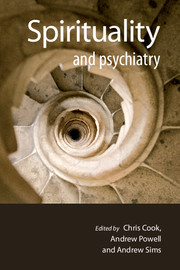Book contents
- Frontmatter
- Contents
- List of contributors
- List of tables, boxes and figures
- Foreword
- Preface
- The Spirituality and Psychiatry Special Interest Group of the Royal College of Psychiatrists
- 1 Spirituality in psychiatry
- 2 Assessing spiritual needs
- 3 Psychosis
- 4 Suicide
- 5 Child and adolescent psychiatry
- 6 Psychotherapy
- 7 Intellectual disability
- 8 Substance misuse
- 9 Neuroscience of the spirit
- 10 Spiritual care in the NHS
- 11 The transpersonal perspective
- 12 Religion and religious experiences
- 13 Pathological spirituality
- 14 Ageing
- Index
The Spirituality and Psychiatry Special Interest Group of the Royal College of Psychiatrists
Published online by Cambridge University Press: 02 January 2018
- Frontmatter
- Contents
- List of contributors
- List of tables, boxes and figures
- Foreword
- Preface
- The Spirituality and Psychiatry Special Interest Group of the Royal College of Psychiatrists
- 1 Spirituality in psychiatry
- 2 Assessing spiritual needs
- 3 Psychosis
- 4 Suicide
- 5 Child and adolescent psychiatry
- 6 Psychotherapy
- 7 Intellectual disability
- 8 Substance misuse
- 9 Neuroscience of the spirit
- 10 Spiritual care in the NHS
- 11 The transpersonal perspective
- 12 Religion and religious experiences
- 13 Pathological spirituality
- 14 Ageing
- Index
Summary
This short account of the Spirituality and Psychiatry Special Interest Group (SIG) must start with sincere thanks to my fellow psychiatrists who have made the activities of the Group an inspiring contribution to the work of the Royal College of Psychiatrists. In particular, the members of our SIG Executive Committee continue to give unstintingly of their time and energy over and above the heavy demands of clinical work.
Further, our thanks must go to the College itself, which has generously assisted throughout, providing administrative support, website facilities and, not least, in commissioning the publication of this book.
We hope the book will attract the attention of a wide readership of mental health professionals, service users, carers, and spiritual advisors, indeed all who seek to understand the suffering that characterises mental disorder. The publication comes in the decennial of the inauguration of the Spirituality and Psychiatry SIG and it gives me the opportunity briefly to record how we began, the work we have undertaken so far, and some of the future developments we are keen to see taking place.
The idea of starting a spirituality interest group came to me as the culmination of many years of puzzling over the divide between spirituality and psychiatry. Historically, spiritual matters have tended to be viewed as being either outside the remit of mental healthcare or else coming to the attention of the clinician as a symptom of illness, religious delusions being just one such example. However, spirituality has not been seen as important to explore in relation to a person's core values and beliefs, although expressing a fundamental aspect of selfhood and personal identity.
Not so many years ago, it was felt intrusive to ask directly whether patients had suffered sexual abuse. Yet we now know that this area of enquiry, when handled with respect and sensitivity, is not only welcomed by our patients, but leads to a better understanding of problems that have arisen and of how to help the person concerned. This example might seem a far cry from asking our patients about their spiritual and religious beliefs and practices, yet psychiatrists have similarly hesitated to enquire about how such personal beliefs affect how our patients view themselves and their lives, what impact this might have on falling ill, be it contributory or protective, and how it may influence the kind of help a person needs.
- Type
- Chapter
- Information
- Spirituality and Psychiatry , pp. xv - xviiiPublisher: Royal College of PsychiatristsPrint publication year: 2009

